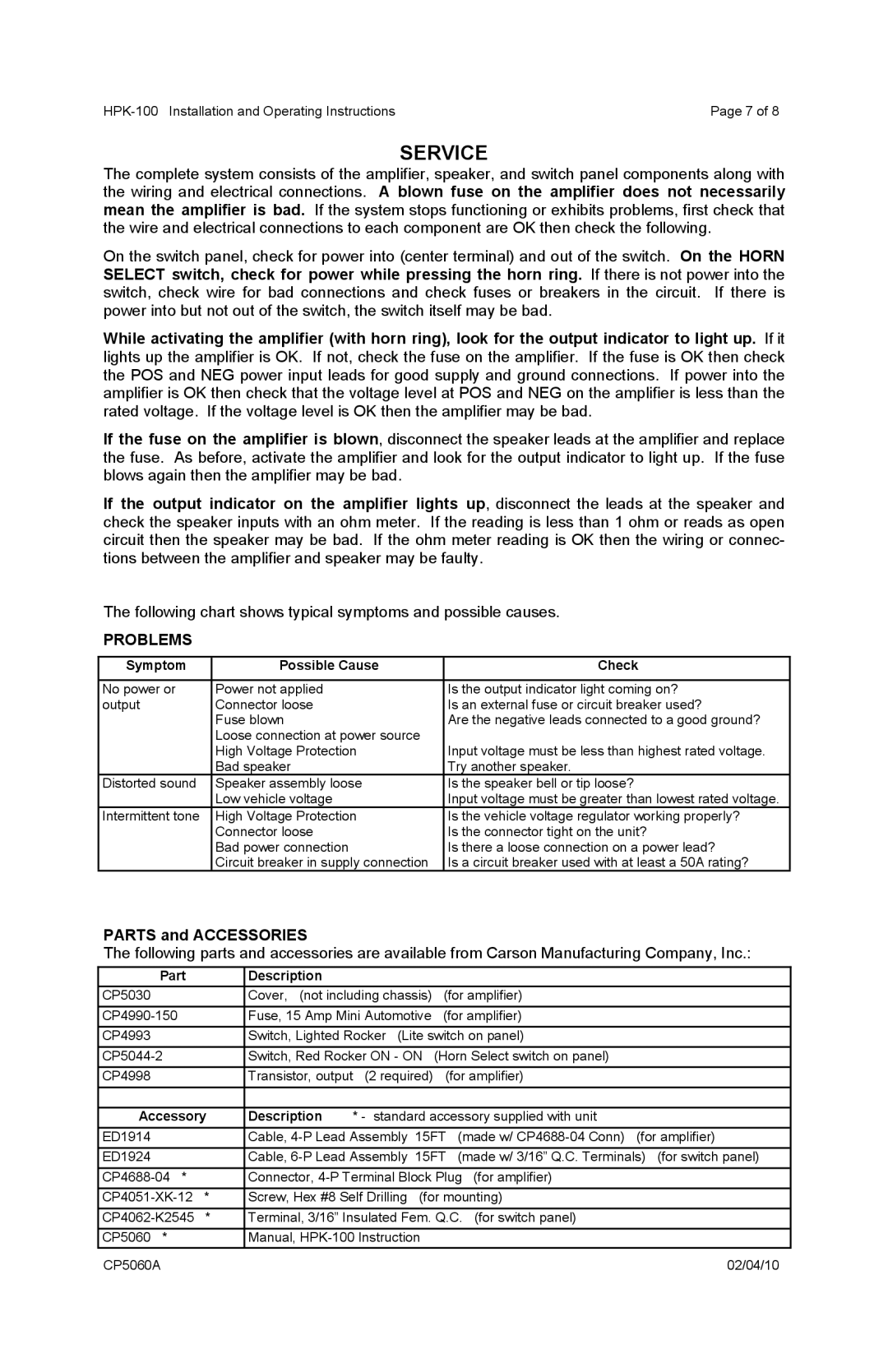Page 7 of 8 |
SERVICE
The complete system consists of the amplifier, speaker, and switch panel components along with the wiring and electrical connections. A blown fuse on the amplifier does not necessarily mean the amplifier is bad. If the system stops functioning or exhibits problems, first check that the wire and electrical connections to each component are OK then check the following.
On the switch panel, check for power into (center terminal) and out of the switch. On the HORN SELECT switch, check for power while pressing the horn ring. If there is not power into the switch, check wire for bad connections and check fuses or breakers in the circuit. If there is power into but not out of the switch, the switch itself may be bad.
While activating the amplifier (with horn ring), look for the output indicator to light up. If it lights up the amplifier is OK. If not, check the fuse on the amplifier. If the fuse is OK then check the POS and NEG power input leads for good supply and ground connections. If power into the amplifier is OK then check that the voltage level at POS and NEG on the amplifier is less than the rated voltage. If the voltage level is OK then the amplifier may be bad.
If the fuse on the amplifier is blown, disconnect the speaker leads at the amplifier and replace the fuse. As before, activate the amplifier and look for the output indicator to light up. If the fuse blows again then the amplifier may be bad.
If the output indicator on the amplifier lights up, disconnect the leads at the speaker and check the speaker inputs with an ohm meter. If the reading is less than 1 ohm or reads as open circuit then the speaker may be bad. If the ohm meter reading is OK then the wiring or connec- tions between the amplifier and speaker may be faulty.
The following chart shows typical symptoms and possible causes.
PROBLEMS
Symptom | Possible Cause | Check |
|
|
|
No power or | Power not applied | Is the output indicator light coming on? |
output | Connector loose | Is an external fuse or circuit breaker used? |
| Fuse blown | Are the negative leads connected to a good ground? |
| Loose connection at power source |
|
| High Voltage Protection | Input voltage must be less than highest rated voltage. |
| Bad speaker | Try another speaker. |
Distorted sound | Speaker assembly loose | Is the speaker bell or tip loose? |
| Low vehicle voltage | Input voltage must be greater than lowest rated voltage. |
Intermittent tone | High Voltage Protection | Is the vehicle voltage regulator working properly? |
| Connector loose | Is the connector tight on the unit? |
| Bad power connection | Is there a loose connection on a power lead? |
| Circuit breaker in supply connection | Is a circuit breaker used with at least a 50A rating? |
PARTS and ACCESSORIES
The following parts and accessories are available from Carson Manufacturing Company, Inc.:
Part | Description |
|
|
|
CP5030 | Cover, (not including chassis) | (for amplifier) | ||
Fuse, 15 Amp Mini Automotive | (for amplifier) | |||
CP4993 | Switch, Lighted Rocker (Lite switch on panel) | |||
Switch, Red Rocker ON - ON | (Horn Select switch on panel) | |||
CP4998 | Transistor, output (2 required) | (for amplifier) | ||
|
|
| ||
Accessory | Description | * - standard accessory supplied with unit | ||
ED1914 | Cable, | (made w/ | ||
ED1924 | Cable, | (made w/ 3/16” Q.C. Terminals) (for switch panel) | ||
Connector, | ||||
Screw, Hex #8 Self Drilling (for mounting) | ||||
Terminal, 3/16” Insulated Fem. Q.C. (for switch panel) | ||||
CP5060 * | Manual, |
|
| |
CP5060A | 02/04/10 |
